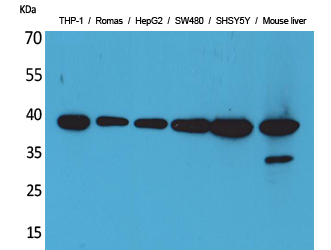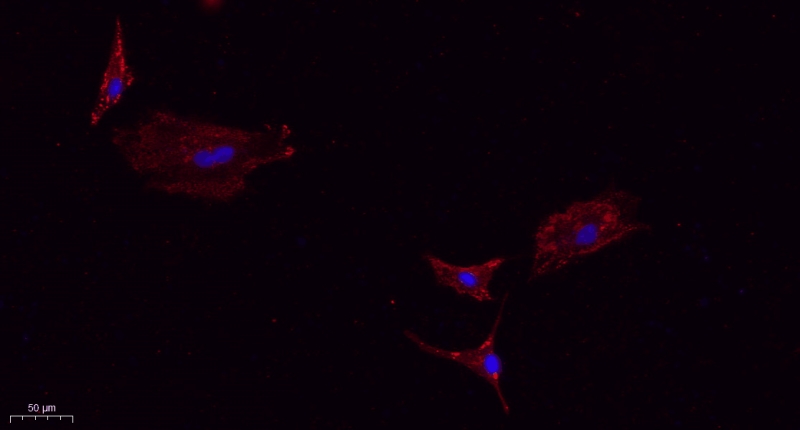

| WB | 咨询技术 | Human,Mouse,Rat |
| IF | 咨询技术 | Human,Mouse,Rat |
| IHC | 咨询技术 | Human,Mouse,Rat |
| ICC | 1/100-300 | Human,Mouse,Rat |
| FCM | 咨询技术 | Human,Mouse,Rat |
| Elisa | 1/20000 | Human,Mouse,Rat |
| Aliases | IL10; Interleukin-10; IL-10; Cytokine synthesis inhibitory factor; CSIF |
| Entrez GeneID | 3586; |
| WB Predicted band size | 20kDa |
| Host/Isotype | Rabbit IgG |
| Antibody Type | Primary antibody |
| Storage | Store at 4°C short term. Aliquot and store at -20°C long term. Avoid freeze/thaw cycles. |
| Species Reactivity | Human |
| Immunogen | Synthesized peptide derived from the Internal region of human IL-10. |
| Formulation | Purified antibody in PBS with 0.05% sodium azide,0.5%BSA and 50% glycerol. |
+ +
以下是3-4条关于IL-10抗体的参考文献及其简要摘要(内容为示例,具体文献请通过学术数据库核实):
---
1. **"Interleukin-10 and the Interleukin-10 Receptor"**
*作者:Moore, K.W., et al.*
**摘要**:综述IL-10及其受体的生物学功能,重点讨论IL-10在抑制炎症反应和调节免疫应答中的作用,并提及针对IL-10通路的抗体在治疗慢性炎症疾病中的潜力。
2. **"IL-10-Producing and Naturally Occurring CD4+ Tregs: Limiting Collateral Damage"**
*作者:Fiorentino, D.F., et al.*
**摘要**:研究IL-10在调节性T细胞(Treg)中的表达机制,揭示抗IL-10抗体阻断实验对自身免疫疾病模型的影响,证明IL-10在维持免疫耐受中的关键作用。
3. **"Antibody-Mediated Neutralization of IL-10 Enhances Antitumor Immunity in Mice"**
*作者:Mumm, J.B., et al.*
**摘要**:通过动物模型证明,使用抗IL-10抗体中和IL-10可增强CD8+ T细胞的抗肿瘤活性,提出IL-10抗体联合免疫检查点抑制剂治疗癌症的可能性。
4. **"IL-10-Dependent Modulation of Th17 Cells in Multiple Sclerosis"**
*作者:Bettelli, E., et al.*
**摘要**:探讨IL-10对Th17细胞的抑制作用,发现抗IL-10抗体加剧实验性自身免疫性脑脊髓炎(EAE)症状,提示靶向IL-10可能用于多发性硬化症等疾病的治疗。
---
建议通过PubMed、Google Scholar等平台检索具体文献,并补充最新研究进展。
Interleukin-10 (IL-10) is a pleiotropic cytokine produced by immune cells, including T cells, B cells, macrophages, and dendritic cells, as well as certain non-immune cells. Discovered in the 1990s, IL-10 is primarily recognized for its anti-inflammatory and immunosuppressive roles. It inhibits pro-inflammatory cytokine production (e.g., TNF-α, IL-6) and suppresses antigen-presenting cell activity, thereby modulating immune responses to prevent tissue damage during infections or autoimmune reactions. However, IL-10's dual role in both resolving and perpetuating disease—such as its immunosuppressive effects in cancer—has driven interest in therapeutic targeting.
IL-10 antibodies, either neutralizing or agonist, are tools to modulate IL-10 signaling. Neutralizing antibodies block IL-10 binding to its receptor (IL-10R), potentially enhancing anti-pathogen or anti-tumor immunity by alleviating immune suppression. Conversely, agonist antibodies mimicking IL-10 activity aim to treat inflammatory disorders like inflammatory bowel disease (IBD) or rheumatoid arthritis. Challenges include balancing therapeutic efficacy with safety, as IL-10's context-dependent functions may lead to paradoxical outcomes. Current research explores engineered IL-10 variants and antibody combinations to improve specificity. Clinical applications remain experimental, with ongoing trials assessing IL-10-targeted therapies in cancer immunotherapy and autoimmune diseases.
×